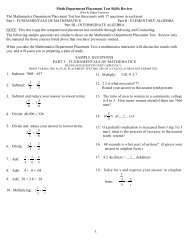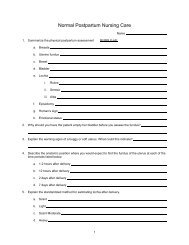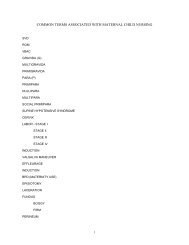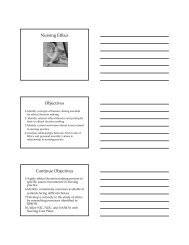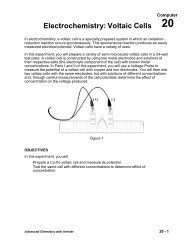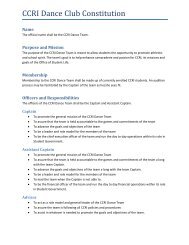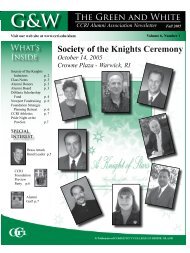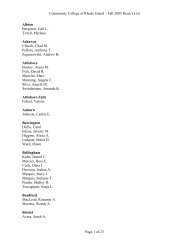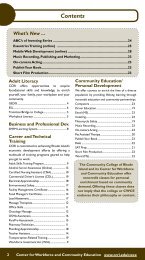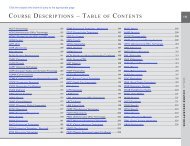Course Descriptions - Community College of Rhode Island
Course Descriptions - Community College of Rhode Island
Course Descriptions - Community College of Rhode Island
You also want an ePaper? Increase the reach of your titles
YUMPU automatically turns print PDFs into web optimized ePapers that Google loves.
permitting or a cloudy night astronomical<br />
exercise. Note: This elective does not fill<br />
the science requirement. Lecture: 3 hours<br />
ASTR 1010 - The Solar System - 4 Credits<br />
Major topics covered in this course are<br />
the historical development <strong>of</strong> astronomical<br />
understanding, concepts <strong>of</strong> the celestial<br />
sphere, the technology <strong>of</strong> astronomical<br />
observations, modern planetary science<br />
derived from the space program, small<br />
bodies <strong>of</strong> the solar system and the origin<br />
and evolution <strong>of</strong> the solar system. Evening<br />
observing sessions are included as an<br />
optional part <strong>of</strong> the course (clear skies permitting).<br />
Note: This course fulfills one lab<br />
science requirement for the A.A. degree.<br />
Lecture: 3 hours, Lab: 2 hours<br />
ASTR 1020 - The Stellar System -<br />
4 Credits<br />
This course includes the study <strong>of</strong> the science<br />
<strong>of</strong> analyzing radiation that reaches<br />
Earth from extraterrestrial objects; the sun;<br />
stellar properties; the life cycles <strong>of</strong> stars;<br />
systems containing more than one star<br />
including clusters and galaxies, extraordinary<br />
objects such as neutron stars, pulsars,<br />
black holes and quasars; and the origin and<br />
evolution <strong>of</strong> the universe. Evening observation<br />
sessions are included as an optional<br />
part <strong>of</strong> the course (clear skies permitting).<br />
Note: This course fulfills one lab science<br />
requirement for the A.A. degree. Lecture: 3<br />
hours, Lab: 2 hours<br />
ASTR 2010 - Practical Astronomy I -<br />
4 Credits<br />
This course presents topics in celestial<br />
mechanics. Emphasis is on the use <strong>of</strong> astronomical<br />
tables and instruments in practical<br />
problems. Practical experience with a telescope<br />
at an observatory is included. Note:<br />
This course fulfills one lab science requirement<br />
for the A.A. degree. (Prerequisites:<br />
ASTR 1010 and 1020 and MATH 1210, that<br />
may be taken concurrently) Lecture: 3 hours,<br />
Lab: 2 hours<br />
ASTR 2020 - Practical Astronomy II -<br />
4 Credits<br />
This course presents topics in celestial<br />
photography, photometry and astrophysics.<br />
Emphasis is on the use <strong>of</strong> attachments<br />
for special purposes, such as astrographic<br />
camera and solar photography. Practical<br />
experience with astronomical instruments<br />
at an observatory is included. (Prerequisite:<br />
ASTR 2010) Lecture: 3 hours, Lab: 2 hours<br />
Biol (Biology)<br />
BIOL 0500 - Building Science Skills for<br />
the Biological Sciences - 3 Credits<br />
This lecture-laboratory course is designed<br />
to prepare students for college-level biology<br />
courses. The building <strong>of</strong> skills in reading,<br />
writing, terminology and experimental<br />
techniques in the biological sciences is<br />
presented using an active learning process.<br />
Study methods, note -taking, time management<br />
and types <strong>of</strong> tests for the biological<br />
sciences are also included. Lecture: 1.5 hours,<br />
Lab: 1.5 hours<br />
BIOL 0600 - Essentials <strong>of</strong> Anatomy &<br />
Physiology - 1 Credit<br />
This five-week, modular, online course<br />
prepares students for success in Human<br />
Anatomy – BIOL 1010 and Human Physiology<br />
– BIOL 1020. The focus <strong>of</strong> this course<br />
is development <strong>of</strong> basic skills required for<br />
success in higher education: study skills,<br />
time management, basic math and language<br />
skills. Students learn the essential science<br />
background necessary to be successful<br />
in life science courses: basic concepts in<br />
Biology (biological terminology, cellular<br />
structure) and basic concepts in Chemistry<br />
(ions, chemical bonding, terminology and<br />
chemical notation). Lecture: 3 hours<br />
BIOL 1000 - Cell Biology for<br />
Technology - 4 Credits<br />
This biology course is designed to introduce<br />
basic biological principles while<br />
specifically examining life processes at the<br />
cellular level. Topics include cell chemistry,<br />
the relationship between cell structure and<br />
function, metabolism, molecular genetics<br />
and cellular communication. Contemporary<br />
cell-related technology, as well as<br />
its impact and significance, is emphasized.<br />
(Prerequisites: ENGL 0890 with a grade <strong>of</strong><br />
“B” or better or ACCUPLACER exemption<br />
from reading. Students also must demonstrate<br />
competency in mathematics through required<br />
math placement testing: a math ACCUPLACER<br />
score equivalent to the successful completion<br />
<strong>of</strong> pre-algebra or successful completion <strong>of</strong> any<br />
<strong>of</strong> the following courses or their equivalent:<br />
MATH 0600, 1200, 1420, 1700, 1900, 1910,<br />
1920, 2910 or 2990) Lecture: 3 hours, Lab:<br />
3 hours<br />
BIOL 1001 - Introductory Biology:<br />
Organismal - 4 Credits<br />
This course is one part <strong>of</strong> a two-semester<br />
introduction to the fundamentals <strong>of</strong> biology<br />
intended for science majors. However,<br />
BIOL 1001 may be taken independently <strong>of</strong><br />
BIOL 1002. The course investigates biology<br />
at the organismal level through the presentation<br />
and discussion <strong>of</strong> biological processes<br />
and systems, including genetics, evolution<br />
and ecology. Additionally, the diversity in<br />
form and function <strong>of</strong> multi-cellular organisms<br />
(plants, fungi and animals) is explored.<br />
(Prerequisites: ENGL 0890 with a grade <strong>of</strong><br />
“B” or better or ACCUPLACER exemption from<br />
reading and MATH 0500 with a grade <strong>of</strong> “C”<br />
or appropriate placement test score) Lecture: 3<br />
hours, Lab: 2 hours.<br />
BIOL 1002 - Introductory Biology:<br />
Cellular - 4 Credits<br />
This course is one part <strong>of</strong> a two-semester<br />
introduction to the fundamentals <strong>of</strong> biology<br />
intended for science majors. It may be<br />
Prerequisite: Successful completion <strong>of</strong> course required before registering. Corequisite: <strong>Course</strong> must be taken prior to or at the same time.<br />
astr-biology<br />
taken independently <strong>of</strong> BIOL 1001. Using<br />
the theme <strong>of</strong> evolution as a framework,<br />
the course investigates biology at the cellular<br />
level through the presentation <strong>of</strong> such<br />
topics as structure, function, metabolism,<br />
genetics, reproduction and differentiation.<br />
Additionally, the diversity in form and<br />
function <strong>of</strong> unicellular organisms (bacteria,<br />
archae, and protists) is explored. (Prerequisites:<br />
ENGL 0890 with a grade <strong>of</strong> “B” or better<br />
or ACCUPLACER exemption from reading and<br />
MATH 0500 with a grade <strong>of</strong> “C” or appropriate<br />
placement test score) Lecture: 3 hours,<br />
Lab: 2 hours.<br />
BIOL 1005 - Biology in the Modern<br />
World - 4 Credits<br />
This course investigates the basic biological<br />
principals needed to understand and make<br />
informed decisions regarding vital biological<br />
issues in today’s world; for example, global<br />
warming, obesity, biodiversity, cancer, race,<br />
genetic engineering and human population<br />
growth. Note: This course is designed for<br />
non-science majors; not open to science<br />
majors. This class fulfills four credits <strong>of</strong><br />
Math/Science General Education requirements.<br />
(Prerequisites: ENGL 0700 and MATH<br />
0500 with grade <strong>of</strong> “C” or appropriate placement<br />
test score.) Lecture: 3 hours, Lab: 2 hours<br />
BIOL 1010 - Human Anatomy -<br />
4 Credits<br />
This course is a study <strong>of</strong> the human<br />
organism with respect to the gross and<br />
microscopic anatomy <strong>of</strong> the organ systems.<br />
Laboratory work includes dissection <strong>of</strong><br />
the cat and appropriate isolated organs.<br />
(Prerequisites: ENGL 0890 with a grade <strong>of</strong><br />
“B” or better or ACCUPLACER exemption from<br />
reading and MATH 0500 with a grade <strong>of</strong> “C”<br />
or appropriate test score. Recommended: Take<br />
BIOL 1002 before taking BIOL 1010.) Lecture:<br />
3 hours, Lab: 3 hours<br />
147



